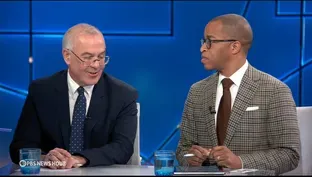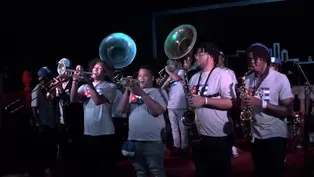
Helicopters restricted near D.C. airport after collision
Clip: 1/31/2025 | 8m 4sVideo has Closed Captions
Helicopter flights heavily restricted near Washington airport after midair collision
Helicopter flights are restricted near Washington's Reagan National Airport as investigators search for clues into what might have caused Wednesday night's deadly midair collision between a commercial jet and an Army helicopter. John Yang reports on the latest and Geoff Bennett speaks with Les Abend, a retired American Airlines captain and contributing editor to Flying Magazine.
Major corporate funding for the PBS News Hour is provided by BDO, BNSF, Consumer Cellular, American Cruise Lines, and Raymond James. Funding for the PBS NewsHour Weekend is provided by...

Helicopters restricted near D.C. airport after collision
Clip: 1/31/2025 | 8m 4sVideo has Closed Captions
Helicopter flights are restricted near Washington's Reagan National Airport as investigators search for clues into what might have caused Wednesday night's deadly midair collision between a commercial jet and an Army helicopter. John Yang reports on the latest and Geoff Bennett speaks with Les Abend, a retired American Airlines captain and contributing editor to Flying Magazine.
How to Watch PBS News Hour
PBS News Hour is available to stream on pbs.org and the free PBS App, available on iPhone, Apple TV, Android TV, Android smartphones, Amazon Fire TV, Amazon Fire Tablet, Roku, Samsung Smart TV, and Vizio.
Providing Support for PBS.org
Learn Moreabout PBS online sponsorshipAMNA NAWAZ: Welcome to the "News Hour."
The black box from the Army helicopter that collided with a passenger jet near Washington's Reagan National Airport this week has been recovered.
GEOFF BENNETT: Investigators hope to gather valuable data as they try to understand what led to the deadly midair crash.
As John Yang reports, families were also briefed today by officials and met with the medical examiner.
JOHN YANG: Police boats were back on the Potomac River today as divers searched for the remaining bodies of the 67 people who died in the midair collision of a passenger jet and an Army helicopter, both aircrafts still submerged in the icy waters.
And, today, the first major change since the crash.
The FAA shut down most low-altitude helicopter flights near the busy Washington Reagan National Airport, one of the nation's most congested airspaces shared until now by commercial jets and government helicopters.
Meanwhile, NTSB investigators began analyzing the passenger jet's cockpit voice and flight data recorders, the so-called black boxes.
On FOX News this morning, Defense secretary Pete Hegseth said the Pentagon is trying to find out if the crew was using night-vision goggles.
PETE HEGSETH, U.S. Defense Secretary: The qualification was a night flight.
They could have been used.
You have a lot of ambient light, a lot of things happening around Reagan.
There can be depth perception problems.
Again, that's speculation.
Our investigation will tell us more.
JOHN YANG: Several news outlets say that, at the time of the crash, one of the controllers in the airport's tower was handling both planes and helicopters, tasks normally performed by two individuals.
That practice is allowed, but typically later in the evening, when traffic is slower.
At the White House, reporters asked whether the flying public should be concerned about FAA staffing levels.
In response, Press Secretary Karoline Leavitt doubled down on President Trump's controversial comments yesterday about diversity and inclusion.
KAROLINE LEAVITT, White House Press Secretary: When you are flying on an airplane with your loved ones, which every one of us in this room has, do you pray that your plane lands safely and gets you to your destination or do you pray that the pilot has a certain skin color?
I think we all know the answer to that question.
And, as President Trump said yesterday, it's common sense.
JOHN YANG: More than 40 bodies of the crash's 67 victims have been recovered.
And we're learning more about those victims.
Ian Epstein and Danasia Elder were the flight attendants on the passenger jet; 13-year-old figure skater Jinna Han and her mother, Jin, were among those returning from were among those returning from a skating camp.
Civil rights attorney Kiah Duggins had been in Wichita for her mother's surgery.
This fall, she was to become a professor at Howard University Law School.
Michael Stovall was one of seven friends on Flight 5342 returning from a duck hunting trip.
And Chief Warrant Officer Andrew Eaves and Staff Sergeant Ryan O'Hara, both husbands and fathers, were two of the three soldiers aboard the Black Hawk helicopter.
For the "PBS News Hour," I'm John Yang.
GEOFF BENNETT: And the crash is spurring many more questions about the safety of the U.S. aviation system and whether other changes might be needed.
For a pilot's perspective, we're joined tonight by Les Abend, a retired American Airlines 777 captain.
He's also a contributing editor to "Flying" magazine.
Thank you for being with us.
LES ABEND, Contributing Editor, "Flying": Glad to be here.
GEOFF BENNETT: The altitude of this military helicopter is coming under scrutiny.
The New York Times is reporting today that the helicopter that collided with the passenger jet appears to have been flying too high and outside of its approved flight path at the time of the crash.
Add to that President Trump posted on social media that the helicopter was flying - - quote -- "flying too high by a lot."
As we await the findings of this investigation based on your experience and your review of the new videos of the crash, what's your best assessment of what transpired?
LES ABEND: Well, listen, everything is pure speculation at this point.
None of us should be making conjectures or anything of that nature with reference to what's happened.
The altitudes that this helicopter might have been flying, I think is being reported by data networks like FlightAware and so on and so forth.
That's using GPS altitude, which can be different than regular altitude.
Indeed, it's possible.
My gut feel when I first saw this accident was that these pilots of the Black Hawk might have identified the wrong aircraft and didn't realize it until the last minute.
Now, if they were using NVG goggles... GEOFF BENNETT: Night-vision goggles.
LES ABEND: ... and you get - - night-vision goggles, correct.
If you use those goggles, ambient light, especially coming from a landing light of another aircraft, can potentially blind you.
So that's a possibility as well.
But this is what the NTSB is doing.
We will find there are a number of contributing factors to this terrible, terrible tragedy.
GEOFF BENNETT: Meantime, the FAA has indefinitely shut down the low-altitude helicopter corridor that was in use at the time of the collision.
In your view, is the airspace around Reagan National, is it too crowded?
What other changes need to be made?
LES ABEND: Well, it's crowded.
And it's been that way for decades.
And we have managed to get through decades with no midair collisions of any consequence that have actually had fatalities.
So, yes, it's busy, busy airspace.
We have got military operations.
We have got civilian operations.
We have restrictive airspace.
I think what we could do is, let's take a look at what we have now.
What is it that potentially caused this problem?
And evaluate that first.
Where can we make changes?
Is it possible that we could have more restrictions on what we call airplane and trail, in other words, the distance between the airplane ahead of us and the airplane behind us?
Do we need to increase that spacing?
It's increased during weather operations because airplanes have to slow down and configure early when they don't see the ground initially.
So it can be a complicated and challenging experience, but a lot of times there's visual approaches which follow the Potomac River right to the particular runway, especially if they're coming from the north.
GEOFF BENNETT: This also has raised questions about the air traffic controller shortage.
Again, we don't know to the degree that that played a role in this collision, but the shortage is so severe that you have many air traffic controllers working 10-hour shifts six days a week.
Big picture, what danger does that present, if at all, to the flying public?
LES ABEND: Yes, no doubt that this could be a potential issue, but it could be a potential issue in any facility.
This is a very busy facility.
There's some really, really sharp controllers that work for this particular facility.
If indeed it's a staff shortage, it could be related to this accident.
Once again, we don't know, but anybody working on a job that's as intense and as stressful as this one is -- has the potential to be fatigued, just as pilots have the potential to be fatigued.
So there are regulations that restrict pilots and air traffic controllers on how long they can work, controllers, how long they can be on a counsel at one particular time.
Are they stretching it and pushing it to the limit?
It's possible.
We don't know yet.
GEOFF BENNETT: Les Abend, thanks again for joining us with your insights.
We appreciate it.
Brooks and Capehart on Trump's tariffs and spending freeze
Video has Closed Captions
Brooks and Capehart on Trump's new tariffs and spending freeze chaos (9m 53s)
Musicians work to forge relations between U.S. and Cuba
Video has Closed Captions
Musicians use their art as a gateway to better relations between the U.S. and Cuba (10m)
News Wrap: Judge blocks Trump's plans to freeze grants
Video has Closed Captions
News Wrap: Judge blocks Trump's plans to freeze federal grants and loans until Monday (5m 17s)
Syrian revolutionary describes his vision for rebuilding
Video has Closed Captions
Syrian revolutionary describes his vision for rebuilding after 13 years of civil war (7m 28s)
UNRWA vows to keep providing aid to Gaza despite Israeli ban
Video has Closed Captions
UNRWA vows to keep providing aid to Gaza despite Israeli ban (7m 57s)
What we know about Trump's tariffs on Mexico, Canada, China
Video has Closed Captions
What we know about Trump's plan to slap tariffs on Mexico, Canada and China (3m 24s)
Providing Support for PBS.org
Learn Moreabout PBS online sponsorshipMajor corporate funding for the PBS News Hour is provided by BDO, BNSF, Consumer Cellular, American Cruise Lines, and Raymond James. Funding for the PBS NewsHour Weekend is provided by...

















